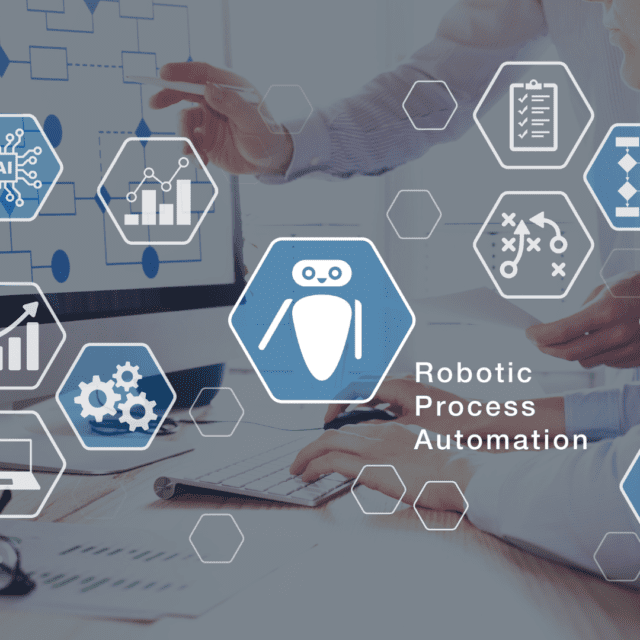Robotic Process Automation

Robotic Process Automation (RPA) at KONCPT AI
In the era of digital transformation, businesses face increasing pressure to operate more efficiently, reduce costs, and deliver better customer experiences. Robotic Process Automation (RPA) is a game-changing technology that automates repetitive, rule-based tasks, allowing organizations to optimize workflows, improve productivity, and reduce human errors. At KONCPT AI, we specialize in providing cutting-edge RPA solutions that empower businesses to streamline operations, enhance efficiency, and focus on more strategic, high-value tasks.
What is Robotic Process Automation (RPA)?
RPA involves the use of software robots or “bots” to perform repetitive, manual tasks that are traditionally done by humans. These tasks can include data entry, processing invoices, updating customer information, and handling transactions. By mimicking human actions, RPA bots interact with applications, systems, and databases just like a human would, but with greater speed, accuracy, and consistency.
RPA is designed to work alongside existing IT infrastructure, making it a cost-effective and non-invasive solution for automating processes across various departments such as finance, HR, customer service, and supply chain management.
Why is RPA Important for Your Business?
RPA offers a wide range of benefits for businesses of all sizes and across industries. The ability to automate manual tasks enables organizations to achieve higher levels of efficiency, reduce operational costs, and improve service delivery. Here are some key reasons why RPA is important for your business:
RPA bots work 24/7 without the need for breaks, vacations, or sleep. This allows your business to process more transactions, handle more data, and complete tasks faster than ever before.
Human error is a common issue in manual tasks, especially those involving large amounts of data entry or processing. RPA eliminates these errors by ensuring that tasks are executed with precision every time, leading to better data quality and improved compliance.
Automating repetitive tasks reduces the need for human intervention, leading to significant cost savings in terms of labor and operational expenses. By automating low-value tasks, businesses can reallocate resources to more strategic initiatives.
RPA can easily scale with your business. As your organization grows and processes become more complex, RPA bots can be deployed to handle increased workloads without the need for additional hires or infrastructure.
RPA ensures that tasks are completed in accordance with predefined rules and regulations, helping businesses maintain compliance with industry standards. This is particularly important in industries like finance, healthcare, and insurance, where regulatory compliance is critical.
By automating mundane, repetitive tasks, RPA frees up your employees to focus on more meaningful, creative, and high-value work. This leads to higher employee satisfaction, engagement, and productivity.

How KONCPT AI Implements Robotic Process Automation
At KONCPT AI, we provide a comprehensive approach to RPA implementation that aligns with your business goals and objectives. Our team of experts works closely with you to identify automation opportunities, design and develop custom RPA solutions, and ensure seamless integration with your existing systems. Here’s how we help you leverage RPA for maximum impact
The first step in our RPA journey is understanding your business processes. We conduct an in-depth analysis of your current workflows, identifying tasks that are repetitive, rule-based, and time-consuming. This assessment helps us pinpoint areas where automation can deliver the most value, allowing us to create a roadmap for RPA implementation.
We also assess the potential benefits of automating each process, including cost savings, efficiency improvements, and error reduction. Our goal is to ensure that RPA delivers a significant return on investment (ROI) for your business.
At KONCPT AI, we believe that one size does not fit all. That’s why we develop customized RPA solutions that are tailored to your unique business requirements. Whether you need to automate finance, HR, customer service, or any other department, our team designs RPA bots that align with your specific processes.
Our RPA development process includes designing, configuring, and testing bots to ensure they perform tasks accurately and efficiently. We use industry-leading RPA platforms like UiPath, Automation Anywhere, and Blue Prism to build scalable and reliable automation solutions.
RPA solutions provided by KONCPT AI integrate seamlessly with your existing IT infrastructure, including ERP systems, CRM platforms, databases, and other applications. This ensures that your business can leverage the full power of automation without the need for extensive system overhauls or costly implementations.
Our team ensures that RPA bots interact smoothly with your applications, perform tasks consistently, and work harmoniously with human employees to create a hybrid workforce that drives productivity and operational efficiency.
Once RPA bots are deployed, we provide ongoing monitoring and support to ensure they continue to perform at peak efficiency. Our team monitors bot performance, tracks key performance indicators (KPIs), and provides regular updates to optimize processes over time.
As your business evolves, we help you scale and adapt your RPA solutions to meet changing demands. Whether you’re expanding into new markets, handling more transactions, or facing new regulatory requirements, our RPA bots are designed to grow with your business.
Key Applications of RPA Across Industries
RPA has the potential to transform a wide range of industries and functions. Below are some examples of how RPA can be applied across different sectors:
RPA is revolutionizing finance and accounting by automating processes such as accounts payable, accounts receivable, financial reporting, and reconciliation. By automating these tasks, businesses can improve accuracy, reduce processing times, and ensure compliance with regulatory requirements.
HR departments can benefit greatly from RPA by automating processes like employee onboarding, payroll processing, performance reviews, and leave management. Automation streamlines these workflows, reducing manual intervention and improving employee experience.
In customer service, RPA bots can handle routine tasks such as responding to customer inquiries, processing requests, and updating customer records. By automating these tasks, businesses can provide faster, more efficient service while reducing the workload on human agents.
RPA can automate supply chain processes such as inventory management, order processing, and shipment tracking. By ensuring accurate data and real-time visibility, RPA helps businesses optimize their supply chains and improve customer satisfaction.
In the healthcare industry, RPA can automate administrative tasks such as patient scheduling, billing, and claims processing. Automation helps reduce administrative burden, allowing healthcare professionals to focus on patient care and improving overall efficiency.

The Future of RPA: Trends and Innovations
The future of RPA is bright, with new trends and innovations shaping the way businesses approach automation. Here are some of the key trends we see in the RPA space:
- Intelligent Automation: The combination of RPA with AI and machine learning is driving the next generation of intelligent automation. This allows bots to not only perform repetitive tasks but also make decisions, analyze data, and predict outcomes.
- Hyperautomation: Hyperautomation is the process of automating as many business processes as possible using a combination of RPA, AI, and other advanced technologies. This approach aims to create fully automated enterprises that can operate with minimal human intervention.
- Low-Code/No-Code RPA: As businesses seek faster automation deployment, low-code/no-code platforms are gaining popularity. These platforms allow non-technical users to build and deploy RPA bots without the need for extensive coding expertise.
- RPA in the Cloud: Cloud-based RPA solutions are becoming more prevalent as businesses look to leverage the scalability, flexibility, and cost-effectiveness of cloud infrastructure for their automation needs.
Conclusion
Robotic Process Automation is transforming the way businesses operate, delivering unprecedented efficiency, accuracy, and scalability. At KONCPT AI, we provide cutting-edge RPA solutions that empower businesses to automate their processes, reduce costs, and drive growth. Whether you’re looking to automate simple tasks or complex workflows, our team has the expertise to deliver solutions that meet your needs and exceed your expectations.
Ready to unlock the power of automation? Contact KONCPT AI today to learn more about our RPA services and how we can help your business thrive in the digital age.



